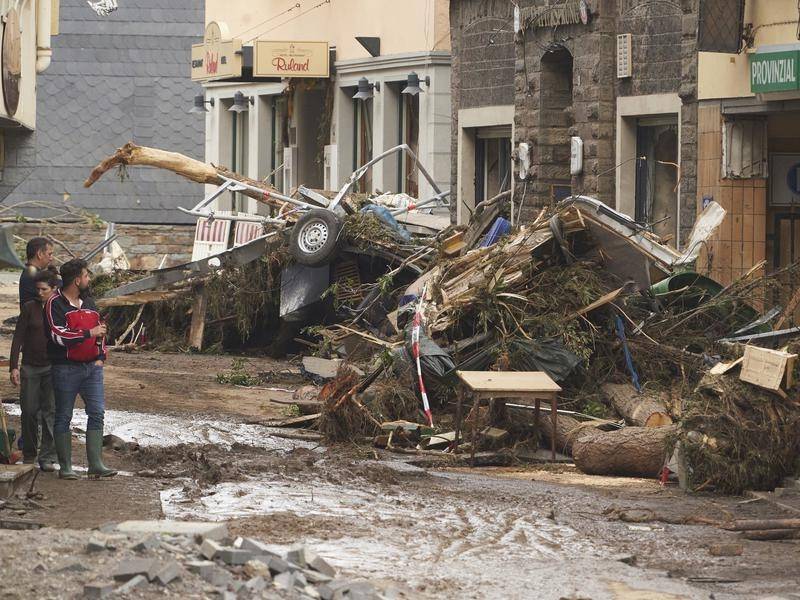
More than 1000 people are missing and more homes have been destroyed in flood-stricken regions of western Germany and Belgium where waters are still rising and the death toll has reached 117.
Entire communities lay in ruins after swollen rivers swept through towns and villages in the western German states of North Rhine-Westphalia and Rhineland-Palatinate, Belgium as well as the Netherlands.
"It was so terrible, we couldn't help anyone. People were waving out of the windows," Frank Thel, a resident of Schuld, told Reuters in front of a pile of rubble in the Rhineland-Palatinate town, where several buildings had collapsed.
In Germany alone, 103 people have died in what is the country's worst mass loss of life in years. Twelve of the dead were residents of a home for disabled people in Sinzig south of Cologne who were surprised by the flash floods during the night.
The death toll is expected to rise further as more houses collapse, while in Belgium, media said at least 14 had died.
Some 114,000 households in Germany were without power and mobile phone networks collapsed in some flooded regions, which meant that family and friends were unable to track down their loved ones.
"Our state is experiencing a flood catastrophe of historic dimensions," North Rhine-Westphalia premier Armin Laschet said, citing extensive damage in 23 towns and rural districts.
In Rhineland-Palatinate, around 1300 people were reported missing in the Ahrweiler district south of Cologne, the district government said on Facebook.
Further north, in Erftstadt near Cologne, several houses collapsed on Friday morning, and authorities feared casualties.
Residents had been evacuated but some returned home so officials do not know who might be in the houses, district commissioner Frank Rock said, adding: "We are expecting deaths."
Roads around Erftstadt were impassable as they were washed away by the floods. Rescue crews tried to reach residents by boat and had to rely on walkie-talkies to relay information.
"The network has completely collapsed. The infrastructure has collapsed. Hospitals can't take anyone in. Nursing homes had to be evacuated," a spokeswoman for the regional government of Cologne said.
A district spokesman said some 55 people have been rescued and 15 are still trapped in their houses there.
One dam close to the Belgian border, the Rurtalsperre, flooded, while another, the Steinbachtalsperre, was stabilised early on Friday. Some 4500 people have been evacuated from communities downstream, and a stretch of the A61 motorway has been closed amid fears of a breach.
The German military has deployed over 700 soldiers to help with rescue efforts.
Thousands of residents in the north of the Limburg province in neighbouring Netherlands were ordered to leave their homes early Friday as floodwaters peaked.
Emergency services were on high alert, and authorities were also reinforcing dikes along vulnerable stretches where floodwaters continue to rise.
In Belgium, at least four people were missing.
"The waters are rising more and more. It's scary," Thierry Bourgeois, 52, said in the Belgian town of Liege. "I've never seen anything like it."
Several towns and villages were already submerged, including Pepinster near Liege, where around 10 houses partially or fully collapsed.
The death toll in Germany is the highest of any natural catastrophe since a deadly North Sea flood in 1962 that killed around 340 people. The crash of a high-speed ICE train in 1998 killed 101 people.
European Commission chief Ursula von der Leyen said the scale and intensity of the flooding was a clear indication of climate change and demonstrated the urgent need to act, echoing an earlier message from German Chancellor Angela Merkel.